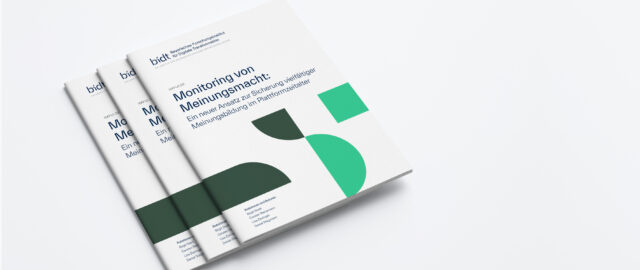A critical reflection on the terms, assumptions, indicators and procedures of the State Media Treaty, concentration control and media diversity monitoring.
The functioning of political public spheres in democracies is not least dependent on the distribution of media opinion power. Against the background of the development of new players in the course of digitalisation, especially intermediaries such as Google, Facebook or YouTube, the need for a reorganisation of the regulation of opinion power and especially of concentration law has been discussed for years.
This working paper reflects from the perspective of political communication research:
- the conceptual foundations of the current legal provisions on the control of opinion power,
- their implementation by the Commission on Concentration in the Media (KEK), and
- the monitoring of media diversity and power of opinion by the state media authorities (Medienvielfaltsmonitor).
Assumptions and premises of the current regulation of opinion power on the basis of a threshold value are critically questioned and, based on this, recommendations for a control and monitoring of media power in the digital age are derived.
The most important points in brief
The regulations of the Interstate Treaty on Media (MStV) on the control of opinion power and concentration as well as the indicators used by the KEK show conceptual, theoretical and empirical deficits. These are so serious that the usefulness of the measures with regard to the formulated goals is limited.
The Media Diversity Monitor of the State Media Authorities avoids some of the weaknesses of the Interstate Treaty on the Media and the approach of the Commission. Positive aspects are, for example, the consideration that goes beyond television, the stronger weighting of media use for current information as well as subjective attributions of meaning by the users.
However, the Media Diversity Monitor does not avoid all the weaknesses already present in the MStV, so that there is still room for improvement, the exploitation of which could strengthen the significance of the monitoring. For example, media intermediaries have not been taken into account so far, which is why the idea of considering all relevant media – whether in an overall market model or in another way – could not yet be realised.
This Working Paper therefore makes recommendations, based on theoretical implications as well as application-related analyses, which should make a positive contribution to ensuring control of opinion power.
The working paper ties in with the working paper by Stark/ Stegmann (2021), which was also developed within the bidt project “Measuring Opinion Power and Diversity on the Internet” and analyses, from the perspective of political communication research, the conceptual foundations of the current legal requirements for controlling opinion power and their implementation by the KEK as well as the monitoring of media diversity or opinion power by the state media authorities.
Research Project



